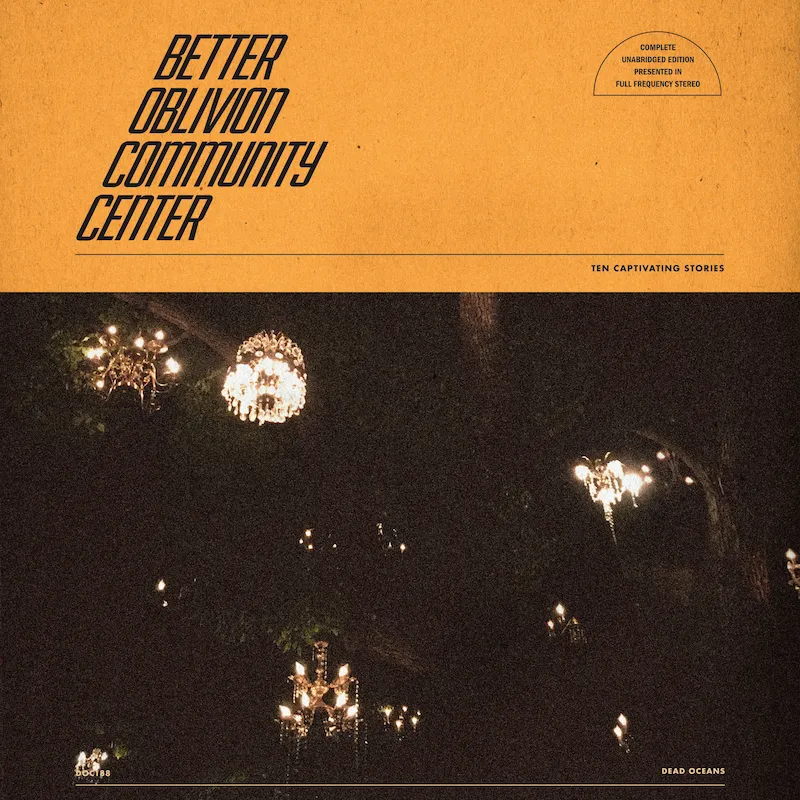In 2019, up-and-coming indie artist Phoebe Bridgers collaborated with her idol, Conor Oberst of Bright Eyes, to create the band/eponymous debut album “Better Oblivions Community Center.” The autumnal listen features jaunty tracks contrasted with melancholy lyrics. Oberst discovered Bridgers in 2016. The following year the two began touring together, with Phoebe singing on Bright Eyes’ song “Lua” and Oberst dueting with Bridgers on her song “Would You Rather.” After years of accompanying each other, they formed their band Better Oblivions Community Center to harness the strengths of both singers.
The album kicks off with “Didn’t Know What I Was In For,” a piece playing with themes of performative activism and institutionalism. Witty remarks from Bridgers in the first verse allude to a charity run. She reveals a cynical streak when she sings about how “there’s no way I’m curing cancer,” yet she still pats herself on the back “for all the good I’ve done.” The following track, “Sleepwalkin’,” jars the listener awake with a loud instrumental introduction that sways its way into the melody. Afterwards, the fan favorite “Dylan Thomas” rallies the strength of Bridgers’ story telling lyrics with an upbeat and percussive chorus. The piece, named after the famous poet Dylan Thomas, begins with an allusion to his poem “Quite Early One Morning.” This sneaky reference gives a nod to Bridgers with one of the lines reading, “Do you hear that whistling? It’s me, I am Phoebe.” Songs “Service Road” and “Chesapeake” possess a lullaby-like tranquility; however, they are interrupted by the forte synth piece, “Exception to the Rule.”
A critique that I’ve seen online often is the placement of the track. I, too, did not understand this choice at first, but as I listened to the album more, I realized that it was because Oberst and Bridgers did not want to lull the listener and instead chose to showcase the variety of styles the band brings to the table. A personal favorite track of mine, “Forest Lawn” reminds me of a windy day with its irresistibly swayable waltz rhythm. The song touches on mortality in a playful tune, discussing the prospect of “ending up in Forest Lawn” – a Las Vegas cemetery – together. Although it seems like a grim place to fantasize being, they bring youth back to the circumstance, saying that it is “where the teenagers drink til dawn.”
Although “Forest Lawn” tackles an intimidating topic in a spirited manner, the next track “Service Road” left me with a pit in my stomach. Written about Oberst’s late alcoholic brother, palpable anger suffuses the diction of the lyric – “Don’t throw a fit, quit acting out,” one verse goes – and Bridgers repeatedly sings “Who are you?” to convey the monster Oberst’s brother became later in life. This song offers a humane approach to addiction that I find refreshing. Despite missing and loving his brother, Oberst still feels angry at his brother’s actions and acknowledges that his demise was solely due to his addiction and refusal to change.
“Big Black Heart” starts off as another acoustic song about false optimism that an unloyal partner would change their ways, and crescendos into a furious, electronic outro, signaling a change in emotion about the rose-colored relationship. Yet, however, the status of the relationship remains “alright for now” and the narrator needs time to “wrap my head around it” before leaving the unsatisfactory partner. Some speculate that Bridgers and Oberst had dated and Bridgers wrote this song about their relationship, but any romantic involvement between the two was never confirmed. “Dominos” ends the album with a voicemail from Oberst talking of cricket sounds and rivers to simulate the nostalgia for childhood summer. As a whole, the album remains a perfect listen for driving down windy roads as the seasons bleed into one another and making peace with fate.


Leave a Reply